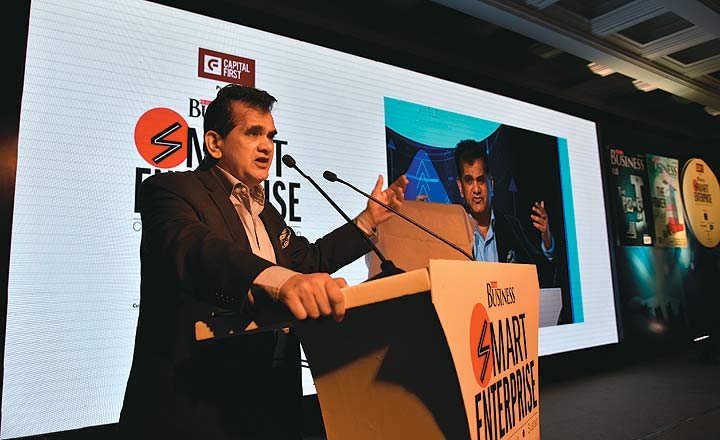This is a great time to organise an event like Outlook Business Smart Enterprise, when the country has made several structural changes to its economy. There has been a huge focus on the ease of doing business; there is the bankruptcy law, the National Company Law Tribunal, and we have also witnessed about 1,200 laws being scrapped. This has never happened in any country. We’ve seen the Goods and Services Tax making its debut. In totality, we have really moved forward in terms of major structural changes to make India a very easy and simple country to work in. This has been one of the biggest challenges because India has had a lot of rules and regulations, procedures and paperwork. And we kept adding to it year after year, thereby making our country one of the most difficult places for medium and small enterprises to do business in. This has been reversed by the re-engineering of business processes.
It’s important that we recognise that the country is heading towards becoming an easy and simple place to do business in the days to come. India’s tax to GDP ratio is 16%, which even in countries such as Bangladesh, Pakistan and Nepal is about 22%. In OECD countries, it is 38%. Therefore, many enterprises in India were not paying taxes at all. India’s policy of tax on tax and its cascading impact was so enormous, that it was rendering India’s manufacturing uncompetitive.

My belief has been that it will be very difficult for our country to create jobs without the ability to manufacture and penetrate the global market. Every country that has grown post World War II, whether it is Japan, Korea or China, has penetrated on the back of exports. Whether you like it or not, many people will tell you that there is a big domestic market, so you must focus only there, and that these are tough times abroad. But India can’t grow at 9-10% for a long period without penetrating the global market. All countries have grown on the back of exports and India can be no exception. While the domestic market is good, the big bucks are out there. Whatever you get in the domestic market, you will get 10x of that in the international market. So, if you want to grow big, if you want to be a smart enterprise, you cannot do it without exporting and without penetrating the global market. But you can’t penetrate global markets till you produce to global standards. Therefore, our ability should be to smartly produce products of a global standard that are “zero effect, zero defect.” India must have a single-minded pursuit of growth. While we are growing at 7.1-7.5%, the challenge is to grow at higher rates of 9-10%. This will not be possible until we don’t enable our medium and small enterprises to grow bigger and bigger, and enable many more smart enterprises to grow bigger and create the right ecosystem.
India is the only country with a billion mobiles and a billion biometrics. We have pushed the Jam (Jan Dhan-Aadhaar-Mobile) Trinity, which has about 280 million new accounts. Soon, your mobile will become your bank and also your wallet. You are heading to a scenario where there will be a smartphone for close to Rs.600-Rs.700, which will lead to a spread of mobiles smartphones across rural areas. India will become data-rich before it becomes rich.
These are the days of technological leapfrogging. We have seen a great number of startups — almost a lakh of them — doing some amazing work. For example, there is Consure Medical doing some remarkable work in the field of stool management. Look at the disruption created by young women entrepreneurs such as Shanti Mohan of LetsVenture and Meena Ganesh of Portea. So, what you’re seeing is a completely new dynamism in our young smart enterprises.
There are a number of studies that show that large companies destroy jobs, but young and middle-level companies and small enterprises are the ones creating jobs. India’s growth story can’t do without jobs, and entrepreneurs need to be given an impetus towards creating jobs. The government has tried to do this by way of giving close to 7.5 crore Mudra loans. The base of the MSME Credit Guarantee Scheme was expanded from Rs.2,500 crore to Rs.7,500 crore. As a result, more loans were given between 2014 and 2017 than between 2000 and 2014. Eighty-two percent of the Mudra loans have been given to women entrepreneurs under the Shishu scheme.
Young entrepreneurs, women entrepreneurs and MSME entrepreneurs all are creating a totally different movement in our country. A lot of disruption is happening across sectors. These are the days of smart enterprises, and of providing impetus to the MSME sector rather than big enterprises. The big will always be defaulters to the bank, but the smaller ones will always be the ones repaying on time. If India has to grow rapidly, we need to push the envelope on small and medium enterprises. We must focus on these young entrepreneurs who will radically transform the landscape of India. The big enterprises will take care of themselves. But if you transform the MSME sector, it will smartly change India. This is the age of technology, of disruption, of technological leapfrogging which India is going to witness in the years to come.











